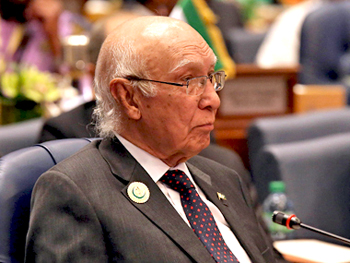New Delhi, Aug 14: National Security Advisers of India and Pakistan will meet in New Delhi on 23 August to discuss all issues connected to terrorism for the first time which Islamabad described as an "ice-breaking" move.
 The confirmation for the talks by Pakistan comes amid simmering tensions following terror attacks in Punjab and Jammu & Kashmir and incidents of ceasefire violations resulting in causalities, prompting strong diplomatic protests from both sides.
The confirmation for the talks by Pakistan comes amid simmering tensions following terror attacks in Punjab and Jammu & Kashmir and incidents of ceasefire violations resulting in causalities, prompting strong diplomatic protests from both sides.
"Yes, I can confirm it that I will be going to India on (August) 23rd for talks," Prime Minister's Advisor on National Security and Foreign Affairs Sartaz Aziz told reporters in Islamabad.
The announcement on Thursday by Aziz came after considerable dilly-dallying by Pakistan, generating speculation that the army was against it as it was unhappy over non-inclusion of Kashmir in the statement which was issued after the meeting between the Prime Ministers of the two countries in Ufa.
According to the Ufa statement, the two sides agreed on a "meeting in New Delhi between the two NSAs to discuss all issues connected to terrorism".
After the meeting between Prime Minister Narendra Modi and his Pakistani counterpart Nawaz Sharif last month, India had proposed 23-24 August for the meeting between National Security Advisor Ajit Doval and Aziz in New Delhi.
"Our Prime Minister has always believed in dialogue. It was India which suspended the meeting which was scheduled between the two Foreign Secretaries on August 25 last year. And then at India's request the two Prime Minister's met in Ufa, Russia, on 10th July and they agreed that the two NSAs will meet in Delhi," Aziz said.
"It (upcoming meeting) is not a breakthrough in terms of composite dialogue on all issues. But at least it is ice-breaking on some issues. And let us hope that it would lead to further more comprehensive dialogue on all the issues between the two countries. So we do believe in dialogue to resolve the issues," he added.
Officials said the decision for the Aziz-Doval meeting was taken after the final nod by Sharif, who returned last night from his three-day visit to Belarus.
Last week, Aziz had said that Pakistan is preparing the agenda for talks.
He had said Pakistan wants a constructive, sustained, unconditional and result-oriented dialogue with India on all issues of mutual concern including the core issue of Kashmir.
A Pakistani Foreign Office official had said Pakistan is aware of India's agenda to highlight the issue of terrorism and planning is being done to counter it.
With India suffering two terror attacks in Punjab and Jammu and Kashmir in the recent past, Doval is expected to make India's case forcefully in the talks over the issue, including the alleged involvement of Pakistani nationals in these attacks and the bail to 26/11 accused Zaki-ur-Rehman Lakhvi.
India has said they have arrested a Pakistani national for carrying out an attack on Indian forces in Kashmir though Islamabad has denied that the attacks were perpetrated by terrorists who had infiltrated from its territory.
There have also been 19 ceasefire violations along the Indo-Pak border in July in which four persons, including three Indian soldiers, were killed. Pakistani troops had targeted forward Indian posts along the LoC on multiple occasions in August also.
Earlier, the two countries had exchanged a war of words over a "spy" drone which Pakistan alleged was being used by India for aerial photography near the Line of Control (LoC), a claim dismissed by New Delhi.





Comments
Add new comment